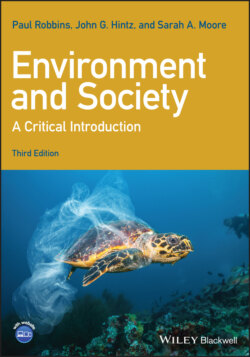Читать книгу Environment and Society - Paul Robbins - Страница 66
Controlling Carbon?
ОглавлениеThere is a growing consensus on the science of climate change and the urgency of the problem. According to the Intergovernmental Panel on Climate Change, whose job it is to vet the science surrounding global warming, global temperatures are rising, sea-level rise is expected, water availability may be impeded, and extreme weather events are likely to become more common and more severe. These changes will be felt unevenly but no country will be immune to such effects.
Given the widespread and severe nature of the problem, why are global carbon emissions so hard to control? One might think of many good reasons for this to be true. People tend to ignore problems they cannot see, governments are under the influence of oil companies, and so on.
One compelling argument holds that the root of the problem is that carbon quite simply does not stay put. With every combustion event (driving a car, burning a log, firing a coal plant for electricity, etc.) the carbon that is released quickly finds its way into the atmosphere. Carbon released in one country is – instantly – a burden shared by all countries. From the point of view of any individual country, moreover, carbon reductions are not “free,” since they require creating new rules, potentially reducing or redirecting economic production. A “carbon-reduced” product – whether a car, computer, or vegetable – may be more difficult to produce than its “status quo” counterpart. If such a product is more expensive as a result, it may not be competitive on a global market, especially if it must compete against products produced where carbon reductions have not been imposed. Many governments, including that of the United States, therefore express fear that if they make sacrifices in this direction while others do not, they will no longer be competitive. The benefits of carbon reduction, in a parallel way, would be experienced by all countries, but must be paid for by individual countries.
For many environmental problems, costs are often borne collectively, while benefits accrue to individuals; on the other hand, individual costs may lead to collective benefits. Nations must cooperate where there is no “super-government” to impose environmental laws and where there are few or no punitive measures for not cooperating. Such mismatches mean that hoping for spontaneous global action on climate change might be unrealistic. Arguably, some kind of rules and trust must be established to cooperate when incentives constantly lure people and states to follow their own self-interest … toward collective planetary ruin. In this chapter, we address this persistent and vexing problem: How, if at all, can rules and norms of global behavior be fashioned to encourage shared costs and collective benefits? At what scale is cooperation possible?
